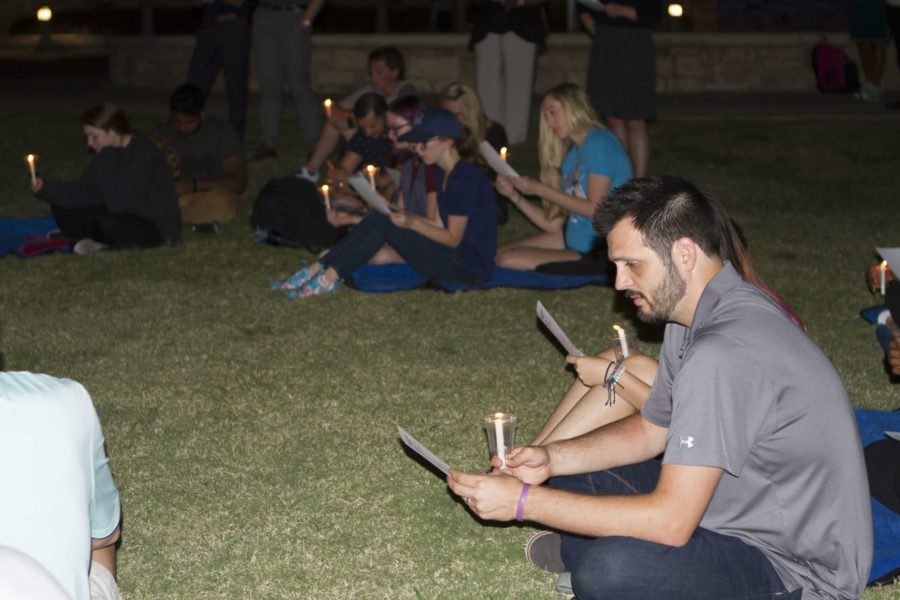Frog Fountain was turned off Monday night to reflect on the lives lost to suicide on TCU’s campus in silence. This was part of the candlelight vigil held to encourage students to look out for one another’s mental health as the TCU community discussed the impacts of suicide and prevention methods. Two TCU students spoke about their own personal experiences with suicide. Madelon Allen, a senior strategic communication major, reflected on her experience losing her mother to suicide during her sophomore year at TCU. Izzy Sanchez, a former Marine, felt suicidal after his boyfriend died while serving in the military abroad. Dr. Linda Wolszon, the director of TCU counseling and mental health center, discussed losing her father to suicide while she was in college. [envira-gallery id=”1189702″] Since 2010, TCU has lost seven students to suicide. Wolszon said the purpose of the vigil is to spread a message of hope. “We may have lost people to suicide and we’re heartbroken about it,” Wolszon said, “but this campus is a culture connection of people caring about each other.” Abbey Widick, a junior political science and communication major and the student body vice president of operations for SGA, said it isn’t just the counseling center that cares, but faculty and staff as well. “Last week when I was feeling extra stressed, one of my old professors, Dr. King, emailed me and said, ‘Just checking on you, you didn’t seem like yourself today,'” Widick said. “I can’t even explain how much these little gestures mean just to know how many different people care.” Wolszon said more students feel more comfortable with seeking help at the counseling center. “For the last two and a half weeks of school, we’ve had 51 students come into the counseling center just since the first day of class,” she said. “[They] report some thoughts of suicide — whether it’s fleeting or whether it’s more frequent.” Since 2012, the number of students seeking treatment for depression has been steadily rising each year. The sharpest rises in students being treated for depression happened in the 2015-2016 and 2016-2017 terms. During those times, the number of students who reported having suicide ideation saw its only drop (2015-2016) and its lowest increase (2016-2017).
The counseling center also continues to train and educate faculty, staff and students on how to prevent someone from committing suicide and how to recognize the risk factors and warning signs of someone who may be suicidal. According to a TCU Question, Persuade, Refer report, a total of 4,209 people were trained at TCU from 2013-2016. Wolszon said multiple factors contribute to a person becoming suicidal. According to TCU’s suicide awareness campaign R U OK?, some of these risk factors may be feelings of hopelessness, impulsivity, lack of social support, untreated mental illness, alcohol or drug abuse. Wolszon also said it’s important to recognize the problem of suicide on college campuses. “This is our opportunity to be aware of it and to take action,” she said. “It doesn’t take much for someone to have a real conversation and say, ‘How are you doing?’ That can interrupt thoughts of suicide.” Widick said she continues to encourage students to confide in someone who may be struggling with thoughts of suicide. “TCU is special in the way that it’s a closer community and there are so many people who would be willing to listen,” she said. “Even if you don’t know them, there are so many people on this campus willing to genuinely listen.” If you or someone you know is dealing with thoughts of suicide or mental illness, you can contact the TCU 24/7 counseling hotline at 817-257-7233 or TCU police at 817-257-7777. For more information on suicide prevention and mental health, you can visit the TCU counseling and mental health center website.







